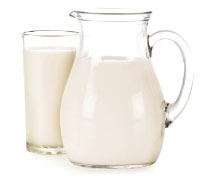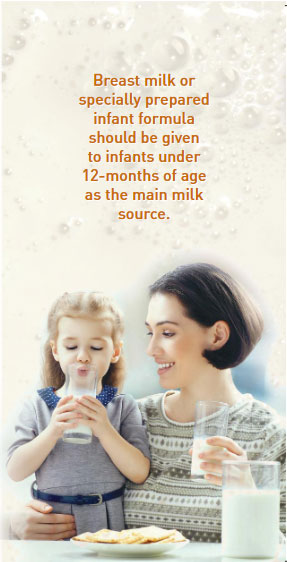Milk and Health Benefits

Why milk is important?

Milk is the first food for human. The digestive system of a new born baby cannot tolerate any other product fully and smoothly without complication similar to mother’s milk until 4 to 6 months of age.

Infants under the age of 12 months should not be given cow’s milk as a main drink.
Breast milk or specially prepared infant formula should be given to infants under 12-months of age as the main milk source.
Reduced fat varieties of milks are not suitable as a milk drink for children under the age of two due to their high energy needs required for growth. For nearly everyone else (over the age of two) this is the best choice.
Milk and health benefits:
Milk, cheese and yoghurt provide calcium in a readily absorbable and convenient form. They also have various health benefits and are a good source of many nutrients, including calcium, protein, iodine, vitamin A, vitamin D, riboflavin, vitamin B12 and zinc. Some people prefer to follow a dairy food-free or milk free diet because of allergies, or intolerances to lactose (the natural sugar in milk). Or because they believe that milk increases mucus. However there is no scientific evidence of any link between dairy products and mucus production. Allergies and intolerance should always be diagnosed by a doctor. Avoiding dairy foods and not making suitable alternative choices such as the ones recommended in this food group can affect your long term health.
Dairy products are associated with maintaining a healthy weight and good bone health. Evidence also continues to mount for associations with reduced risk of several diseases and conditions, including osteoporosis, hypertension, colon cancer, metabolic syndrome and type 2 diabetes.
What is the daily recommended serving from milk and dairy products?

Most people need at least 2-3 serves each day, however, the minimum recommended will vary according to your age, sex and life stage for example, women over 51 years need 4 serves a day as their calcium requirements are high.
A serve of milk, yoghurt, cheese and/or alternatives* is 190 Kcal which is:
- 1 cup (250ml) fresh, UHT long life, reconstituted powdered milk or buttermilk
- ½ cup (120ml) evaporated milk
- 2 slices (40g) or 4 x 3 x 2cm cube (40g) of hard cheese, such as cheddar
- ½ cup (120g) ricotta cheese
- ¾ cup (200g) yoghurt
- 1 cup (250ml) soy, rice or other cereal drink with at least 100mg of added calcium per 100ml
*Choose mostly reduced fat
The following alternatives contain about the same amount of calcium as a serve of milk, yoghurt or cheese:
- 100g almonds with skin
- 60g sardines, canned in water
- ½ cup (100g) canned pink salmon with bones
- 100g firm tofu (check the label as calcium levels vary)
What can I do with these foods?
Milk, yoghurt, cheese and/or alternative products form part of the diets of nearly all Mediterranean and there are endless ways that they can be consumed at any meal or any time of the day. It can be as simple as a glass of milk or slice of cheese, or combining with other foods to make larger meals such as:
- Breakfast – milk/yoghurt (or alternatives) used on cereal, in porridge, in smoothies; cottage cheese/ricotta cheese on whole grain toast
- Lunch – sliced cheese/ricotta/Hallumi cheese on whole grain bread,
- Dinner – grated and grilled cheese on top of main meal, white sauce
- Snacks – tub of yoghurt (or alternative), cold or hot milk drinks including milk based coffees.
- Desserts – Ice cream and dessert style custards are relatively high in calories, fat and added sugars and are considered an empty calorie choice that should be eaten only occasionally. However, lower fat, lower sugar milk based desserts including custards, junkets and puddings, can be made at home. Low sugar, low fat yoghurt (with or without fruit) is a great quick and easy dessert that is low in kilo joules.
*Non-dairy milk drinks can be substituted for cow’s milk in recipes.
What is deficient in milk?
Milk is rich in almost all the micronutrients, such as minerals and essential vitamins, but is lacking in only one essential element, it is the iron. So make sure that your diet plan contains good sources of iron to stay safe and healthy.
Prepared by: Clinical Dietitian
Reference: Australian Government- Department of health



